How I Went Looking for Inspiration, Found It & Launched
Successfully
Hello! What's your background, and what are you working on?
Hi, I'm Hari Krishna, a computer science graduate from India, living in Sydney. I have been a developer, an engineering manager, a product manager, an entrepreneur, and a growth hacker, as well as designer for the last nine years.
I'm currently working on VisaList, which helps you find countries you can visit and get the visa requirements, document checklist, and visa application hassle-free, all in one place. For anyone who wants to know where they can travel with their passport tension-free, VisaList is the answer.
Currently, VisaList has more than 170K users, 1.1M page views, and is growing at 20%.
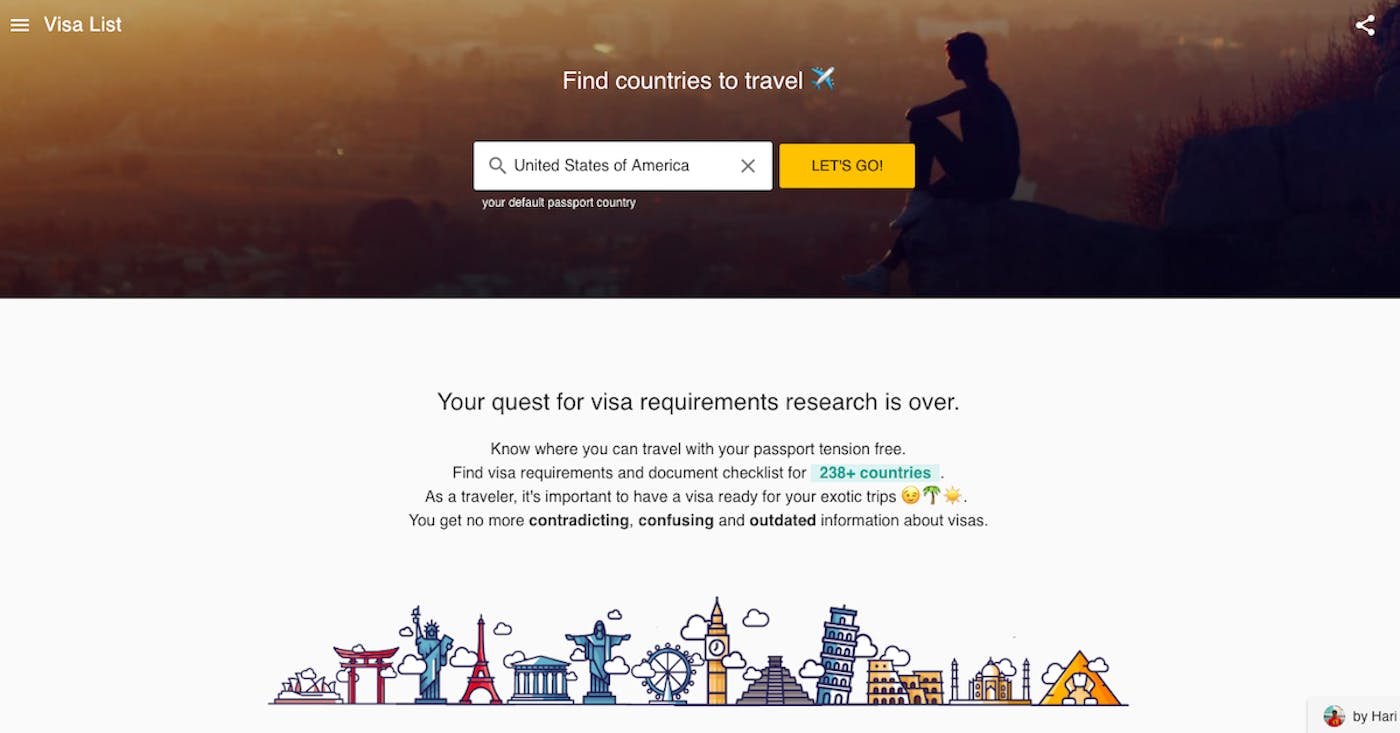
What motivated you to get started with VisaList?
I founded DWorkS in 2009 after my graduation and have been working on open source libraries and micro startups when I’m not at my desk job. I built AnExplorer, a file manager which has more than 100K downloads. I’m also the author of a popular networking library for Android developers, VolleyPlus. In 2017, I made ACrypto, a cryptocurrency app which enables users to keep track of all their cryptocurrencies.
I had a big break with ACrypto, worked on it for six months and placed it into autopilot mode. I was making decent MRR and was looking for new ideas to build my next micro-startup. To help spark some inspiration, I became a digital nomad and started traveling with the intent to visit all the countries that I fancied.
Soon I realized that you need a visa to get into most of these countries and that, while a few have Visa on Arrival (VOA), most require that you go through their embassy in your home country (in my case, India). I wanted to find the countries I could go to without having to wait three weeks to get a visa, so I did some research. I had to wade through a few blogs and websites, but I eventually found a list with the information I need, and off I went! After a few months, I wanted to travel to another country, but I’d lost the original list I’d found so I had to start my research all over again. Luckily, I found a new site that listed even more countries offering VOA. Along the same vein, Amit, a friend of mine, told me that when he was researching visa information for Vietnam, he found almost 10 websites with a .gov address, which was really confusing. In my own research, I found that many blogs don’t have links to official embassy websites, which is ultimately unhelpful.
Overall, trying to find the information I needed was a huge challenge. There was no aggregated visa information shown in any kind of useful way, so each different country required the same amount of tedious research every time I wanted to travel, and most of the blogs and websites I found had very little information and were outdated. It was also very difficult to find official government or embassy websites.
which meant I often ended up paying more money than should be necessary to visa agents.
Frustrated, I searched for a product that could help, but everything I came across just had a table with the very basic visa requirements and nothing more. Even though I had no formal experience in travel and visa related issues, I realized that all of my time researching and traveling had put me in a position to address the need. I decided to aggregate all of the information I could find, organize it, and present it in a useful, digestible way. Thus, VisaList was born!
I built an MVP of the site and shared it with a few friends—and they loved it. Their positive responses gave me the hope and motivation I needed to move forward, so I started building a full-fledged site. In two months' time, it was ready. The public launch was a huge success and it’s been growing strong ever since.
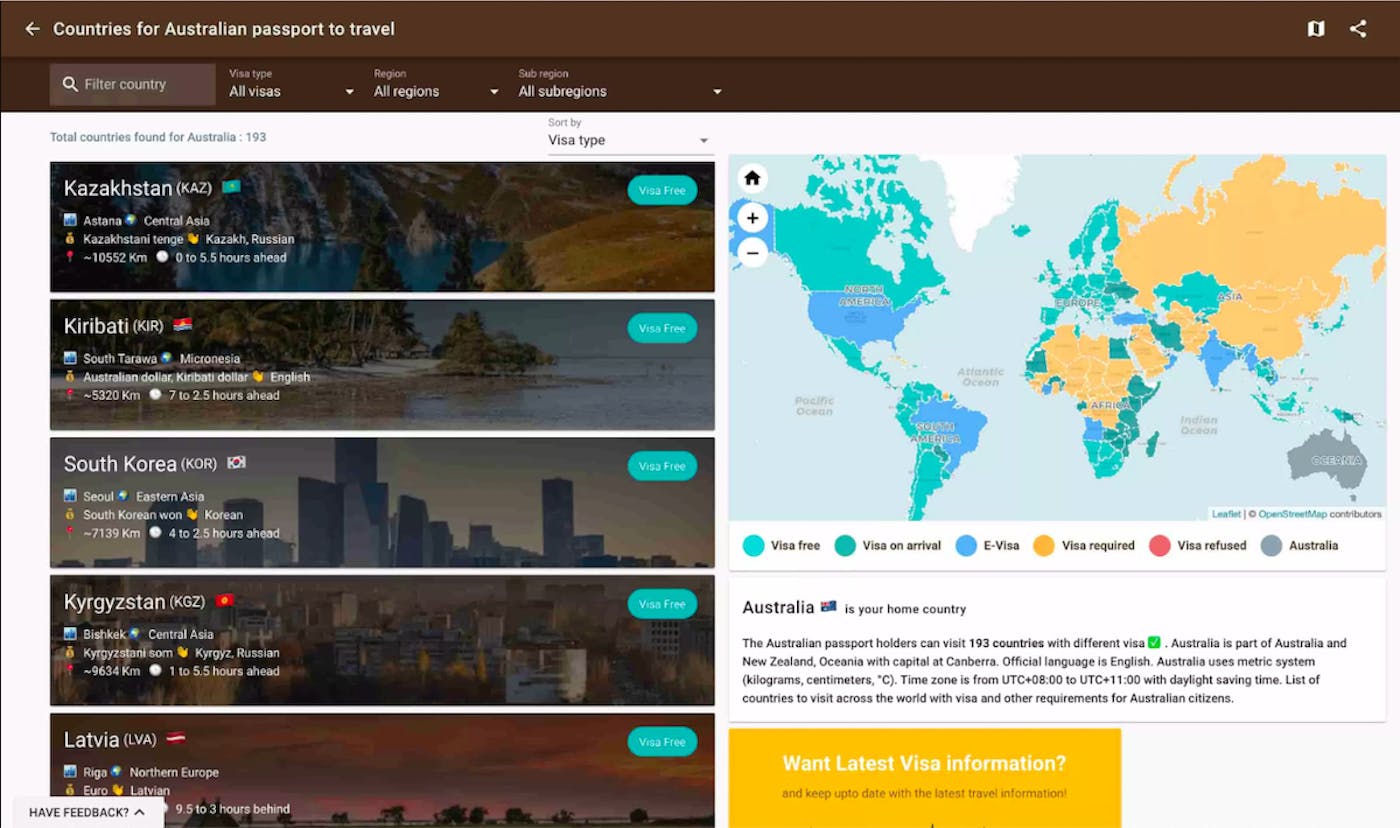
What went into building the initial product?
While it was obvious that a website was the best medium for the service, I quickly realized that I was not that great at website development.
I like a good challenge, so I did some digging to find the best and easiest framework to build an SSR (Server Side Rendering) website with AMP support. I knew that I also wanted to build it out as a mobile app for Android and iOS, so Progressive Web App (PWA) support was very important. And for growth, SEO was crucial, as almost everyone who’s looking for visa information will be searching the internet just like I was.
My good friend, Rizwan, suggested VueJs, which I fell in love with almost immediately. It was really easy to learn and build apps using VueJS, and I also found a framework on top of it called NuxtJS, which had so many things right out of the box and it saved me a ton of time.
Once I started playing around, I was able to finish the MVP in two weeks. I had always stayed away from web development because I had a strong affinity for mobile apps, so it was really satisfying to complete my first web app and I felt really proud of myself.
After that, I planned out all the designs for the remaining features using VuetifyJS, an awesome material design library. It felt like all these tools were serendipitously built just for VisaList and made my development work so much easier. If you are a beginner like I was, I highly recommend using VueJS + NuxtJS + VuetifyJS to build your first web app.
The website work was going great but I soon realized that collecting all visa related data was going to be a big barrier. The whole point of the service was to provide this data, so I had to push through. I looked for open source projects and found a few, but they didn’t quite serve my needs. As it turns out, Wikipedia has all of this information and it is updated regularly by the community. I found an open source project that downloads all the basic data I needed and modified it to work for VisaList.
Rizwan believed in VisaList and helped me with the back end and hosting the data in MySQL. He used Golang to build the API with gorm and gin libraries. I actually picked up Golang from him and have been using it to build back end API. Web development has been so new to me that I didn't know how to do the hosting, the backend, proxying using NGINX, etc. Luckily, Rizwan helped me with all that and I really can’t thank him enough.
Another friend of mine, Sateesh, generously shared his paid SEO course with me. I studied that diligently to get a feel for how SEO works and made changes to the site so that Google could start indexing. I’ve since learned that SEO is huge for marketing and growth and there’s no end to the work you have to put into it to keep it up-to-date.
As I was building out the MVP, I did a bit of research on competitors and similar websites to get a feel for how they approached various aspects of SEO and what kind of content they’d used. Having insight from competitors around best practices was immensely helpful. There were so many things I could have built into the MVP, but I went with my product management intuition and kept it basic. The initial version had just a listing and details page.
My brother, Tirumal, has always been my first and best critic and has been there to support me from day one. My vague idea got molded into a basic version of the product all because of his feedback and suggestions, for which I’m very grateful.
How have you attracted users and grown VisaList?
Up until now, my marketing strategy for a given product was to make a rough plan and execute it immediately, but I made a thorough and deliberate plan for VisaList’s launch and it really paid off. For the initial launch, I made a small checklist on Google Docs to help guide my process. It mapped out launches across different platforms and social networks, as well as help from family, friends, and influencers. VisaList has a huge leg up in the marketing and growth game since the problem it’s addressing is so universal; most people will want to travel somewhere at some point in their life, so anyone and everyone is a potential user.
Prior to launch week, I created an Upcoming Page on Product Hunt but it didn’t get many subscribers. I was disheartened and used my checklist to keep tweaking and improving my launch plan. I had intended to launch pretty immediately after the Upcoming Page, but ended up delaying for a couple of weeks in order to test a few ideas, soft launch in a few other places, and gather some feedback, which turned out to be a great decision. Thanks to my friend Ankit’s suggestion, I added an email subscription just before launch day. Without that, I wouldn’t have had any touchpoint with my users.
I’ve found that there are two things that are crucial to launching or promoting a product: the title and the timing. There are even studies that suggest the best times to post on various platforms.
Just a month after the launch, VisaList had more than 170K users. Here’s a look into my process, with some of my stats and insights about timing:
Product Hunt
Product Hunt (PH) has become the default platform to launch new products and get decent feedback from other makers and hunters. Over the years, I boiled the process of launching on PH down to a science. With this in mind, I followed some previously great launches and used them as a template. One of my friends, Sid, loved my page so much that he made a launch video for VisaList. It was the #1 Product of day and #3 Product of the week. It also was runner up in PH Golden Kitty Awards 2018. This was, by all accounts, a perfect launch.
- Best time: After 00:00 on Sunday
- Tools used: PreviewHunt
- Users: 5K
Hacker News
People say you get the most honest and brutal feedback on Hacker News (HN), and that it’s also very difficult to get to the front page. I didn't enter into this with much hope, but I got lucky and VisaList trended for a whole day. I got tons of valuable, albeit brutal, feedback and it was totally worth it.
- Users: 11K
This was one of the biggest surprises for me. I thought reddit would be similar to PH or HN, but it turned out way better than I could have hoped. The great thing about reddit is there are so many different subreddits and you can post to as many of them as you want (as long as you’re adhering to the rules of each subreddit). Here I did a soft launch in r/SideProject and r/Entrepreneur. I posted VisaList for feedback and the community was really wonderful. These subreddits really helped shape VisaList into what it is today, and the support and positivity kept rolling in until the official launch on r/dataisbeautiful, which put it in front of thousands of people.
The trick to a successful launch on reddit is to treat each subreddit as a completely different launch and user base, and pitch your product as something useful to them instead of just copy-pasting and spamming. When used right, reddit can bring a lot to the table and, honestly, the amount of feedback I got was really overwhelming (in a good way!). Overall, VisaList got 16K upvotes. I couldn't ask for a better launch.
- Best time: PostInspect
- Users: 65K
I wrote a short message asking for feedback and shared it with my friends, pointing them to the PH link as I wanted the feedback to be public.
- Views: 80%
One big thing I learned from reading Pieter Level’s MAKE: Bootstrapper’s Handbook is the title of your post, regardless of platform, needs to be dynamic. It should create excitement around your product and stand out, so I kept this in mind as I crafted my tweet. I also asked my friends, Sid and Hemanth, who are both tech influencers, to tweet their feedback on VisaList.
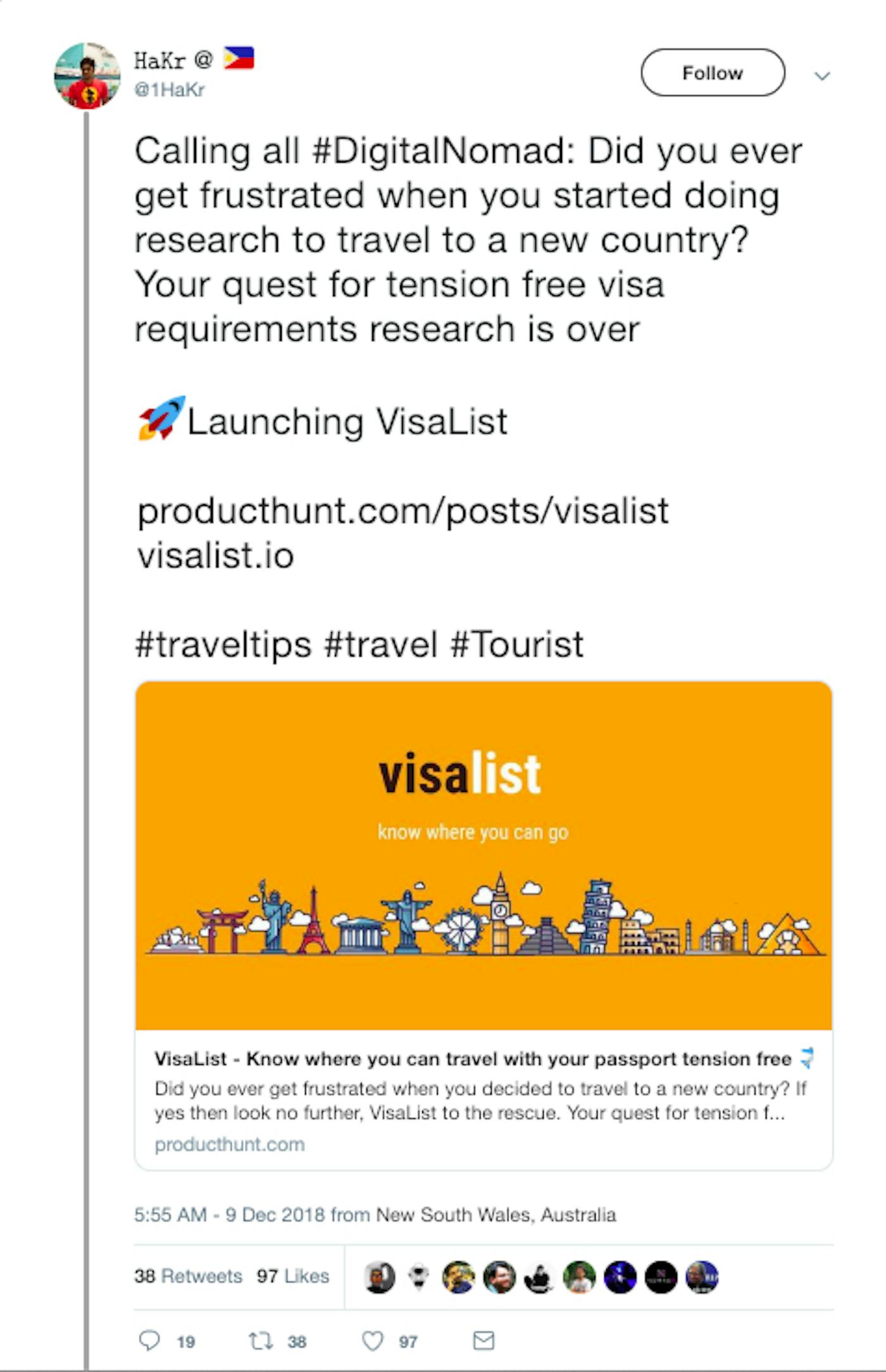
- Best time: 1-2pm Tuesday, Wednesday, and Thursday
- Views: 15K
I asked my good friend, Sateesh, and a few others to post VisaList on LinkedIn. Posting on this platform put the product in front of a much different audience and I ended up with some buyout offers.
- Best time: 4pm Thursdays
- Views: 4K
This one I posted from my company page, and it got decent views.
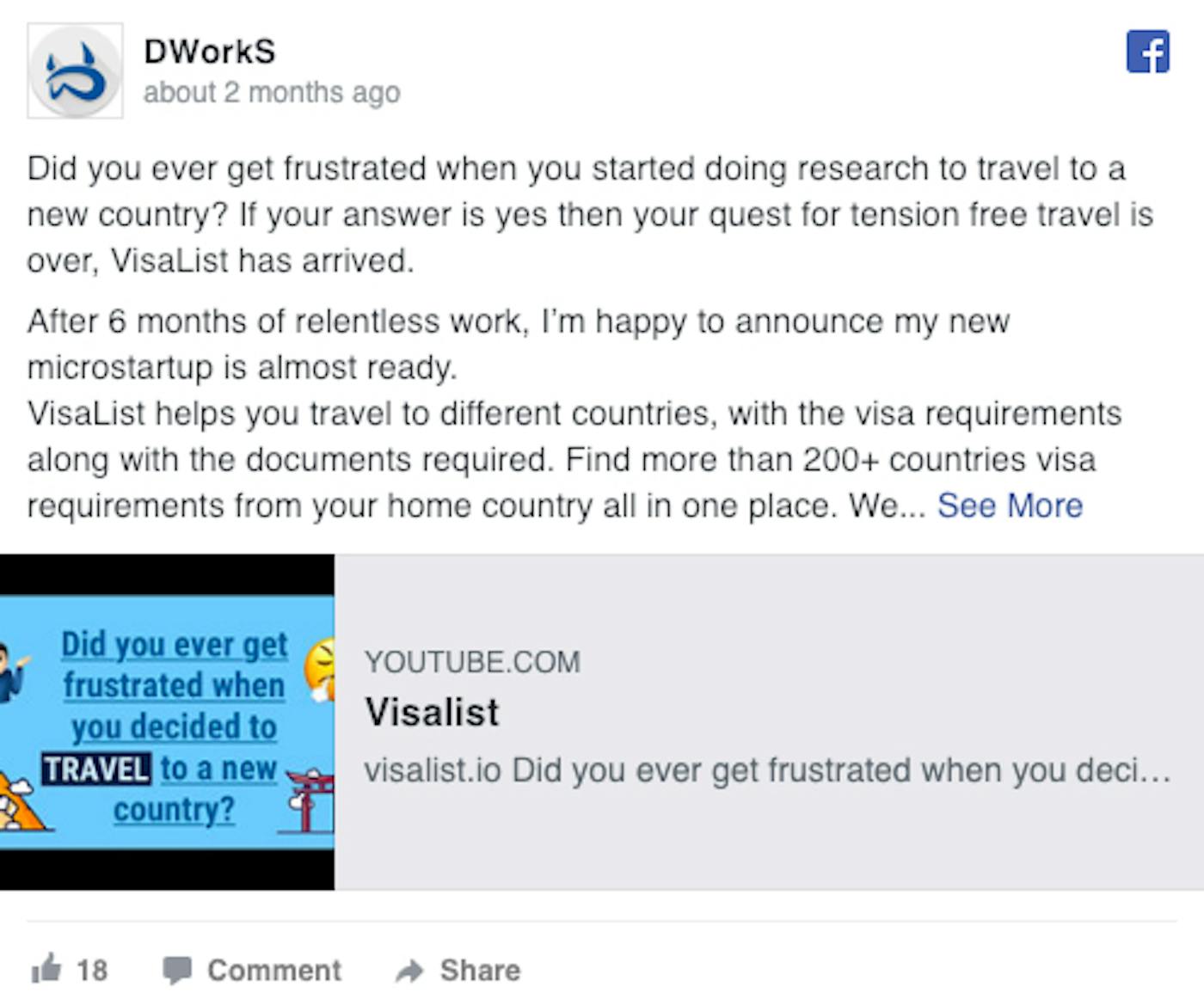
- Best time: 3-4pm Monday
- Views: 5K
News Publications
After the launch, VisaList was quickly picked up by many news publications and has gone completely viral since then. It was covered by Lifehacker, Gizmodo, Gigazine, MakeUseOf, Esquire Magazine, CzechCrunch, and many more all across the world in Russia, Japan, Argentina, China, India, Philippines, USA and, so on.
- Users: 70K
What's your business model, and how have you grown your revenue?
I recognize that there is huge potential for growth in a lot of different directions, and instead of rushing in, I'm going to take them one at a time. Revenue was not the main concern for me, at least not for the first six months post-launch. Luckily, I made a good amount during the launch from various sources, including:
- Revenue from Ads
- Partnership offers from three visa agencies
- Buy-out offers from five different people
- API service clients
- A partnership from a flight aggregator
The first few months of operation didn’t bring in any revenue. In December 2018, VisaList brought in $700, most of which was from ad revenue. The partnership and affiliate revenue have yet to kick in. As this is a content service, the best bet is to get SEO right in order to grow my ad revenue. Partnerships with different visa agencies are also high revenue generators, so they are my highest priorities at the moment.
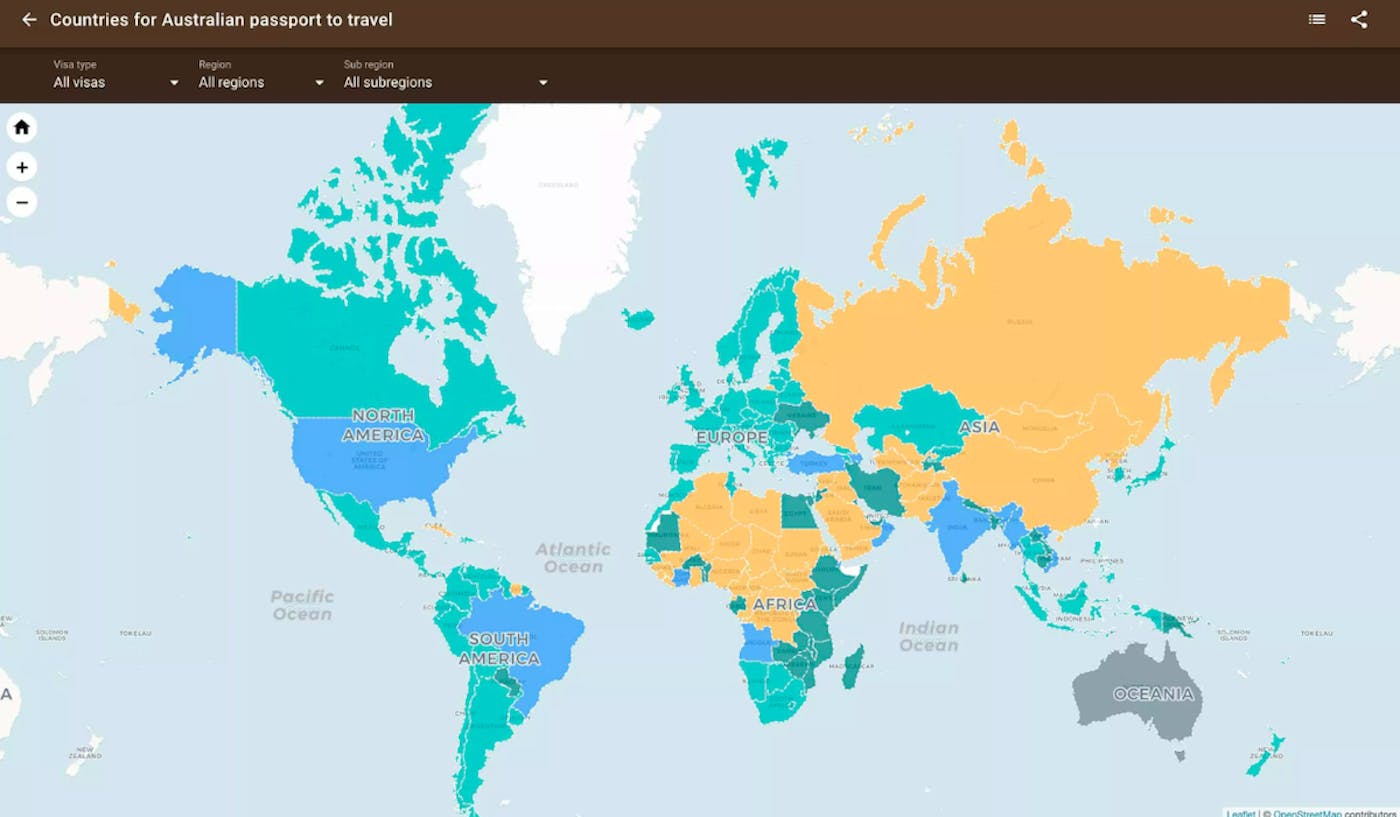
What are your goals for the future?
VisaList is growing very steadily. The most pressing goal is to complete the data sets for each country’s documents checklist and keep improving the SEO. While a successful launch has been a great boon, if you want people to keep coming, SEO is the only way.
I recently integrated visa processing from visa agencies for people who want their visas to be processed quickly and hassle-free. There is a potential to have partnerships with visa agencies in every country, which would be great for revenue. I also plan to build out API service for visa agencies and others who may want to build useful services around visas.
The natural progression of events after getting a visa is booking flights and hotels, which is something I hope to integrate into my platform. I also want to add Scratch maps so that people can keep track of the countries they have visited as well as countries that they want to travel to. I think this feature, in particular, is a good social angle for the platform, as well as adding crowdsourcing features so that the community can keep updating the information and give tips to fellow travelers.
Apart from these new features, I'm thinking of building solutions for the corporate side of things as well. Once I’ve tackled tourist visas, I want to add work and business visas.
I have to admit that I’ve been overwhelmed by the success of VisaList. While researching, I couldn’t find any competitor trying to take on the same problem or offering the same kind of solution. Being the first to market is always a great position to land.
What are the biggest challenges you've faced and the obstacles you've overcome? If you had to start over, what would you do differently?
One of the biggest mistakes I made was to build an improper URL structure, which I later realized has a huge impact on SEO. After two months, I decided to change the entire URL structure, which meant losing the SEO gathered up until that point. Keeping long-term growth in mind, I did it anyway. Because of that, I lost almost all of the indexing of the 45K pages of VisaList, and seeing all that hard work go down the drain was pretty painful. Luckily, things started picking up after a month and reached baseline after just two months. This was a big lesson for me in web development.
The other big mistake was to launch much later than I’d originally planned. I was holding off until I collected the documents checklist, visa application, etc for every country, but only ended up with complete data for 50 countries by the time I launched. It turns out most people didn’t care, they were more interested in the list of countries they could visit visa-free than having complete data for countries that require visas. Of course, hindsight is always 20-20, but if I had to do it all over again, I would have launched within a month of the MVP.
I also wish I had added the crowdsourcing features, like upvoting and tips for fellow travelers, for the big launch. With the 150K+ traffic activated around the launch, it would have made a huge impact.
In terms of building the AMP version of the website, it wasn't a straightforward task since having a normal and AMP site combined was not supported out of the box. I was forced to find little hacks to make a single code base work for both of them, which set me back a bit.
Have you found anything particularly helpful or advantageous?
The biggest predictor of a product’s success, at least for me, is when I’m building solutions that I need personally. It’s one of the fastest and easiest ways to validation product-market fit early in the game. All of my micro-startups have been successful because I started to build them just for me — so I knew immediately that there was a least one customer out there who would use my product. An added advantage is that, when you build something for yourself, you understand the problem inside and out, which contributes to finding better solutions and building a better product.
Also, my cumulative experiences as a developer, product manager, designer, and growth hacker have saved me easily a couple of months that I otherwise might have spent teaching myself all the necessary skills. Having said that, once you become good at the act of learning itself, at exploring and picking new things up, learning new skills and technologies becomes much easier and much more enjoyable.
For product launch, I recommend MAKE: Bootstrapper’s Handbook by Pieter Levels. It’s an amazing book and I have to give it credit for my successful product launch. To improve SEO, I suggest SEO tester online, KW Finder, Varvy, and for performance I like Webpage Test.
What's your advice for indie hackers who are just starting out?
Many people tell you to use ReactJS or some other tech stacks. Don't listen to them. Instead, you need to decide what you want to build and then find the tools and technologies that can bring your particular idea to life the fastest and with the least amount of effort.
Just build and launch. One of the mistakes people often make is to overthink things and take too much time to get the product out. I think the best strategy for indie hackers is to get your product out in no more than two weeks.
Once you’ve got your MVP, plan for the launch. This is where you should be very thoughtful. Think about how you want to sell your product to people and get it into their hands. A great product is useless if nobody is using it.
Taking risks can be daunting, but don't let that stop you from dreaming big. Don't be conservative in anything that you do, chase after your goals aggressively, and learn to handle failure. It's the hardest thing but once you get over it, nothing can stop you. With that, it’s important to believe in what you are building, even if you fail in the beginning. If you keep believing, you will find a way to make things successful. This is the success mantra of makers.
Where can we go to learn more?
VisaList is growing every day and available in every country. If you are looking to travel and want to take some of the stress out of it, dive right in as I'm adding new features every day. You can reach out to me anytime on Twitter @1HaKr. If you like my work and want to support me, you can buy me a coffee. If you have any questions or want to learn more about how I managed all this, feel free to comment here.
I would like to thank Channing for having me on Indie Hackers. I totally enjoyed sharing my experience. 😊

@1hakr Hi there Hari, I'm a big fan of your work and how you've made a living creating these digital products.
I run a site that features interesting stories like this. Mind if I get in touch and do a quick interview over email to feature you?
Cheers!
Sure mate!
Awesome interview. You mentioned failure a lot, I would love to hear more about some of your failed side projects?
Great!
Website is useful and easy to use.
Thanks for sharing how you attracted users.
Good luck.
Thank you. Just contributing back to the community.
This is a great writeup! Very inspiring. Do you mind sharing which paid SEO course it was that your friend Sateesh shared with you?
Its a SEO course from https://www.clickminded.com
Have been following you since ur Acrypto App. I am a believer in solving own itch and this is an excellent example. So much info in this one post, am sure it will help many. Hope to connect on twitter. best of luck.
Thanks, I love doing what I like and sharing what I learn. This is my small contribution to the community.
Hey @1hakr, amazing launch, and frankly, product execution. I'm wondering if twitter's best way to ping you - I work with a related brand that's super keen on VisaList collab/sponsorship; any chance we could connect?
Thanks. Yap, you can message me on Twitter.
awesome UI very polished, and very useful! Try putting more visible ads in the top. I only saw a small one in the bottom right. Also you might explore posibilities with afiliate programmes in the future for buying tickets. :)
Congratulations! I remember seeing this on reddit and spending quite a bit of time playing with it. Thank you for sharing your journey.
I am really impressed by your journey. Thanks for this awesome interview. Good luck!
Thanks mate!
Great product and very well planned launch, congratulations!
Thank you
Great and inspiring story Hari. I'm sure Visalist has huge growth potential.
Thanks sateesh
This is a great inspirational story hari!
I'm glad you found it inspirational
Not sure if you mentioned this in the article, i skimmed through the last half, but what about having affiliate links for hotel and airline (travelocity, etc)!!!
Yes i have already added those and in the process of adding more
Great work mate. I am from India too here. I am in learning phase. I see that you as a developer developed so many apps and services. Can you guide me what should i learn in an order to build and work like you did?
Many thanks and best of luck!
1.1M pageviews in ~2 months 😲
This is awesome man - congrats - great story and thanks for the write up!
Thanks mate!
Now, what a story! And such a handy service for digital nomads like me. +1 to my bookmarks.
I wanted more and more digital nomads to use visalist. I'm glad you liked it.
This comment was deleted 7 years ago
This comment was deleted 7 years ago